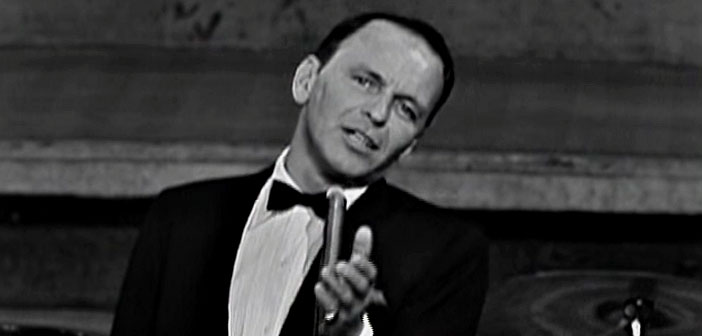Sinatra is a great artist and all great art is relevant, but the future lies with popular music’s return to the world of conflict.
Amid the industrialisation of the nineteenth century, the artist, and especially the poet, deprived of his traditional function in society, tended to identify himself with the vanished aristocracy; Flaubert and Baudelaire are the most characteristic examples. In our own age, when lyric poetry has withered away, and pop music is its only successor, it is interesting to see an artist such as Frank Sinatra presenting an analogous phenomenon.Sinatra’s wealth and obvious opulence are a vital part of the myth that surrounds him. The character that Sinatra plays in his latest film Come Blow Your Horn embodies the qualities of a self-assured aristocrat-nonchalant superiority, relaxed virility and ostentatious prosperity. The in-group, personal allusions in Songs like “Me and My Shadow’, sung as a duet with Sammy Davis Jnr., show Sinatra delighting in membership of a charmed private circle. When asked by a French journa: list if there was anything in the world he wanted and had not got, Sinatra replied ‘No, nothing’. The social situation that Sinatra, in life and art, has chosen for himself, is reflected in the qualities of his lyricism.
There is no specifically Sinatra type of song. His rapid succession of LPs draw on the huge repertoire of popular music from the last forty years. There is a track of his to catch every nuance of love lost or found. But there are certain themes that stand out as characteristic of his work. Projecting his self-assured love of life, many of Sinatra’s songs, like ‘Swinging down the Lane’, ‘You Make me feel so Young’, or ‘Come fly with Me’, express contentment or exuberance. In a society of cynical nihilism, this can only be accounted a positive quality. But it removes his art to a world without conflict, a world that is static and under control. Sinatra frequently stresses his maturity, with the consequent mellowing of emotion, so that he can say to his lover ‘Let’s take it nice and easy; it’s going to be so easy, for us to fall in love’. A frequent theme in his songs is nostalgic memory; in songs like ‘Brazil’, or ‘It happened in Monterey’, stormy passion is situated far away in time and place—it can be regarded as ‘Just One of those Things’.
Even more important than the themes of his songs is Sinatra’s treatment of them. His singing style is marked by relaxed detachment. This is not to question his ‘sincerity’, any more than one would call Brecht insincere when he uses the ‘alienation effect’. But ecstasy and frenzy are qualities which do not enter into Sinatra’s art. This detachment derives from the strongly intellectual element in his style—the irony that marks many of his songs, and the sophisticated cross-talk on such records as his duet with Pearl Bailey ‘A little learning is a dangerous thing’. Sinatra is also deeply concerned with technical perfection—the superb rhythm and timing of his singing, and the magnificent backings of Nelson Riddell and others. We are reminded of the typical modern poet, whose model is ‘le parfait magicien ès lettres’ or ‘il miglior fabbro”.
That a popular singer should share the values of decadent artists is the reflection of an age where the degeneration of both Communism and Social-Democracy has led men to believe that it is impossible to ‘change the world’. Sinatra belongs to the generation before the Rock Revolution—he may sing ‘Everybody’s Twisting’, but the very beat of the music tells us that Sinatra isn’t. Sinatra is a great artist, and all great art is relevant, but the future lies with popular music’s return to the world of conflict.
Ian Birchall, ISIS 16 October 1963. Ian wrote this article when he was 24 for Oxford University student magazine Isis, which was founded in 1892, long before the name was used by the extreme Jihadist group of recent years.

